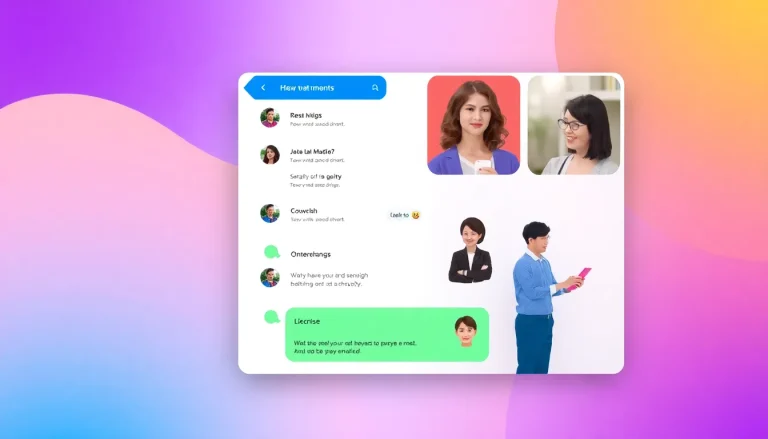
Understanding AI Sales Agents
AI sales agents represent a transformative force in the way businesses approach sales processes. These advanced technologies automate various aspects of the sales cycle, ranging from lead generation to customer engagement. As organizations continue to seek efficiency and effectiveness, AI sales agents are rapidly gaining attention, proving their potential to streamline operations and enhance customer experiences.
What Are AI Sales Agents?
AI sales agents, often referred to as AI Sales Development Representatives (SDRs), are intelligent software applications designed to automate and improve various sales tasks. They utilize artificial intelligence, natural language processing, and machine learning algorithms to mimic human interactions with potential customers. Essentially, these agents can perform tasks that traditionally require human input, significantly increasing efficiency and allowing sales teams to focus on high-value activities.
Key Features of AI Sales Agents
- Lead Generation: AI sales agents can automate lead sourcing, utilizing algorithms to analyze data and identify potential customers based on predefined criteria.
- Personalized Outreach: These agents can craft personalized emails and messages that resonate with potential leads, improving the chances of conversion.
- Data Analysis and Reporting: AI sales agents provide analytics and insights from sales data, helping businesses make informed decisions.
- 24/7 Availability: Unlike traditional sales representatives, AI agents can operate around the clock, ensuring responses are timely and consistent.
- Integration Capabilities: They can seamlessly integrate with existing CRM systems, allowing for streamlined workflows and data management.
How They Transform Sales Processes
The integration of AI sales agents into an organization marks a significant shift in how sales processes are managed. By leveraging these agents, businesses can automate repetitive tasks such as follow-ups, data entry, and lead nurturing, which frees up human agents to engage in strategic planning and relationship-building activities. Furthermore, AI sales agents enhance the scalability of sales efforts, allowing companies to handle larger volumes of leads without significant increases in human resources.
Benefits of Implementing AI Sales Agents
Increased Efficiency and Productivity
One of the most compelling reasons to adopt AI sales agents is the dramatic increase in operational efficiency. AI can process information and execute tasks at speeds far beyond human capabilities. This leads to quicker response times, faster lead qualification, and ultimately, shorter sales cycles. For instance, organizations that employ AI for lead scoring report a significant reduction in the time it takes to move prospects through the sales funnel.
Cost-Effectiveness for Businesses
While the initial investment in AI technology may seem daunting, the long-term savings and profit potential make it a wise choice. By automating repetitive tasks, businesses can reduce costs associated with hiring and training additional staff. Moreover, AI agents can help increase conversion rates, resulting in higher revenue without the proportional increase in overhead costs. Studies show that companies that implement AI-driven solutions can achieve a return on investment (ROI) increase of up to 300% in less than two years.
Enhanced Customer Engagement Strategies
AI sales agents can significantly enhance customer engagement by delivering personalized interactions that reflect the preferences and behaviors of prospects. By analyzing customer data and engagement history, AI agents can tailor their communications, making them more relevant and impactful. For example, an AI sales agent can initiate contact with prospects who have shown interest in a particular product by offering relevant information or special promotions. This not only aids in nurturing leads but also fosters a sense of being valued among customers.
Types of AI Sales Agents
Lead Generation AI Tools
Lead generation AI tools harness the power of big data and machine learning algorithms to identify potential leads efficiently. These tools often scan public databases, social media platforms, and market trends to compile lists of individuals or companies that may benefit from a business’s products or services. For example, platforms like Cognism and Hunter.io offer solutions that help sales teams target high-quality leads with minimal effort.
Chatbot Integrations
Chatbots represent a unique subset of AI sales agents, primarily focusing on real-time customer interaction. Integrated into websites and social media, they can engage visitors, answer queries, and guide potential customers through the sales process. Chatbots can handle multiple inquiries simultaneously, providing immediate responses and ensuring that no lead goes unattended. Additionally, they learn from interactions to improve the quality of their responses over time.
Email Automation Agents
Email automation agents help streamline communication efforts by automating the process of sending personalized emails to targeted leads. These AI agents can segment audiences based on various factors like behavior, demographics, or previous interactions, allowing businesses to send tailored messages that resonate with different segments. Tools like Mailchimp and ActiveCampaign utilize AI algorithms to optimize email marketing strategies, ensuring high engagement rates and conversions.
Challenges and Considerations
Integration with Existing Systems
Integrating AI sales agents with existing sales systems can be a complex process. Organizations must ensure that these agents work seamlessly with their current CRM, data management, and communication tools. This requires careful planning and sometimes, additional technological investment to create the necessary infrastructure for collaboration and data sharing.
Managing Customer Trust
Building and maintaining customer trust in AI-driven interactions is crucial. Sales teams must ensure that AI agents are programmed to prioritize transparency and customer privacy. Clear communication about how AI agents operate and the benefits they provide can help alleviate any concerns customers may have regarding automation and artificial intelligence.
Ongoing Training for AI Agents
Just like sales representatives, AI sales agents require regular training and updates to function effectively. As market trends and customer preferences evolve, AI models must be updated to reflect new data and insights. Continuous monitoring and retraining can help improve the accuracy and effectiveness of AI sales agents, ensuring they remain relevant and efficient over time.
Future Trends in AI Sales Agents
Predictions for 2025 and Beyond
The landscape of AI sales agents is bound to undergo significant changes in the next few years. By 2025, advancements in AI technology are expected to lead to even more sophisticated sales agents capable of complex decision-making processes and deeper data analysis. These agents may start to utilize predictive analytics to anticipate customer behavior, personalize marketing strategies further, and ultimately drive higher conversion rates.
Emerging Technologies in Sales
Technological advancements such as augmented reality (AR) and virtual reality (VR) could begin to influence the effectiveness of AI sales agents. For example, using AR to create immersive product demos can enhance customer understanding and engagement. Additionally, as machine learning algorithms improve, sales agents may evolve to interact with customers in more sophisticated and human-like manners, transforming the way sales are conducted in numerous industries.
Best Practices for Adopting AI in Sales
Adopting AI sales agents requires more than just the latest technology; it demands a strategic approach. Organizations should focus on aligning AI implementation with business goals and ensuring that sales teams are adequately trained to work alongside these agents. Establishing metrics to assess performance and return on investment will help organizations make informed decisions as they refine their AI strategies. It’s also crucial to prioritize customer experience, ensuring that the use of AI enhances rather than detracts from personal interactions.





